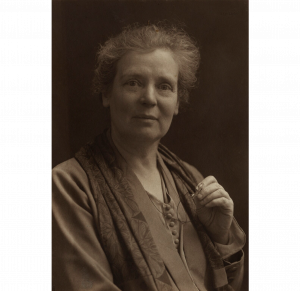
Octavia Margaret Sophia Lewin (1869-1955)
Octavia Margaret Sophia Lewin MB, BS (London) 1896, MD (Chicago) (2 February 1869 – 27 December 1955) was a Registrar and Assistant Physician at the Royal London Homeopathic Hospital (RLHH) and an active suffragist.
Lewin was a colleague of Andrew Tocher Cunningham and Dudley d’Auvergne Wright at the Hopital de L’Alliance in France from 1914-1915.
Lewin practiced at 25 Wimpole Street, London in 1911, and at 8 Manchester Square, London in 1948.
Octavia Lewin was born in Widford, Ware, Hertfordshire, in February 1869, the daughter of Spencer Robert Lewin, a solicitor, and Jessie Augusta Cantwell. She was educated privately by a German governess, and at the Frances Holland School, Queens College in Harley Street and then at Girton College, Cambridge, where she read Natural Sciences.
Lewin qualified in Medicine at the London School of Medicine for Women and became Assistant Physician at the Royal London Homeopathic Hospital.
A committed suffragist, in 1906 she joined the Women’s Social and Political Union. The following year, in 1907, Lewin became a founder member of the Women’s Freedom League, active between 1907 and 1961, and was a militant, non-violent women’s suffrage society formed by dissidents from the WSPU. She would have met Jane Addams and Helena Swanwick at the International Women’s League of Peace and Freedom in 1915, and known many of the women in the movement.
Lewin was also a supporter of the Tax Resistance League, the second annual meeting of which was held at her home.
It is not clear when Lewin chose to practice homeopathic medicine but shortly after qualifying in 1901 she joined the British Homeopathic Society.
In 1903, on her return from America, where she had studied under James Tyler Kent, Lewin became the first woman to read a paper to the British Homeopathic Society. This paper, inspired by Kent was titled “Cases Illustrating Constitutional Treatment,” and helped bring about a revolution in British homeopathy, particularly influencing Lewin’s homeopathic successors Margaret Lucy Tyler and Marjorie Blackie.
During World War I, Lewin worked in France alongside fellow suffragist, old Girtonian, and homeopathic physician, Mabel Hardie. Lewin was appointed Assistant Surgeon at the Military Hospital in Dieppe and at the French Military Hospital in Charenton. She later served as the Aural Surgeon to the Women’s Hospital Corps at the Endell Street Military Hospital run by Louisa Garrett Anderson and Flora Murray.
After the war Lewin continued in practice. She was Resident Medical Officer at Chorlton Union Infirmary and the Rotunda Hospital in Dublin. She was an Assistant Anaesthetist at the Royal Free Hospital, specialising in Rhinology, and she was Rhinologist for the Almeric Paget Corps, Medical Advisor to the Westminster Health Society and Rural Surgeon to the WAAC. Lewin was also the Clinical Assistant at the Central London Throat and Ear Hospital and Honorary Rhinologist for the Society of Women Journalists.
In the 1930s, she was a member of the Council of Management of Bedford College.
Of Interest:
Octavia Lewin’s younger sister, Jessie Augusta Berry, (née Lewin) (1871 – 1955) followed her through Girton College and the London School of Medicine for Women to become a respected doctor in her own right. During World War I she was one of the six “Women of Royaumont” who ran the Hôpital Auxiliaire 301 treating injured French casualties.



Thank you for posting this research. Octavia Lewin never married, but her sister (can’t remember her name) moved to Canada married and had children. One of these children was Jesse Lewin who married her cousin from England, thus she regained the Lewin name through marriage. I know this family history because I was with Jesse’s grand daughter for many years.
Regards
Harvey Shields
Dear Sue
Kieran Walsh is my name. I live in Widford – the birthplace of Octavia Lewin. Widford has a small parish magazine (circulation less than 300). I think that it is only available in paper. Would you mind if we copied your piece on Octavia Lewin for the magazine? We would of course attribute you and include a link back to your site. We are keen to remember women as well as men in the local Great War memorials.
BW
Yrs
Kieran
Dr Kieran Walsh
Dr Lewin was also a governor or school manager of All Souls Church of England School in Riding House Street London W1 in the 1930s. My mother, a pupil told me she remembered her visiting the school in that capacity and was very interested in the health of the pupils.